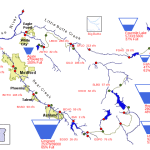History and Update of the So-called Pig Farm South of Ashland – Uproot Meats
Public Agency and Pigs on a Hill
Written by Barbara Cervone

One’s sense of powerlessness these days can stretch wide and deep, from Washington to Uvalde, around the world and back. By comparison, the struggles of a small citizen’s group in Southern Oregon to hold a reckless farmer accountable seem tiny. For those of us caught in the fray, though, they have been consuming.
When I moved from Brooklyn to Ashland four years ago, I never imagined that my first foray into local politics would involve fighting a pig farm on a denuded slope near our house. Nor did I imagine that my initial engagement would grow into a three-year campaign, daresay obsession, to prod county officials to enforce the ordinances it proscribed and to uncover the harmful practices the operation, hidden from view and visitors, pursued with impunity.
Nor did I understand how much accountability and public agency mean to me.
Here’s the saga, what I’ve come to call “Pigs on a Hill.”
A circus on wheels
What does it take to move from ultra-urban Menlo Park and Santa Clara, California to start a pig ranch in the high desert of Central Oregon? Chutzpah, it turns out.
In February 2014, Krista Vegter and her partner, Sonia, both in their 30s, hitched a trailer to their Toyota Tacoma and left California for Northern Oregon. “We picked up 3 pigs, tried getting turkeys but the lady couldn’t catch them, collected 9 rabbits…We had a circus on wheels” Krista recalls.
Ten months later, on a nine-acre ranch in Bend, Oregon, the two women started a coffee roasting business, Gunpowder Ranch and Roasting, and raised and processed a handful of pigs.
Another 14 months and they were gone, headed to Ashland. Here, they purchased 24 acres of low-value property just outside town, on a steep slope with no water rights or electricity.
They set their sights on growing weed, though never applied for the required permit, and proceeded to excavate the slope to create terraced beds for their grow—and a public eyesore for anyone traveling south from Ashland.
The marijuana operation quickly failed, and the two women returned to pigs, then added chickens. They doubled their excavation of the slope and built a slaughterhouse and pens, less than 50 feet uphill from the Ashland Canal that provides water in the summer to nearby farms and gardens and drinking water to the city when drought threatens the municipal supply.
They proceeded with no knowledge or experience to address the waste containment, water, and air quality issues their operation would surely test. Indeed, it appears that they weren’t aware that everything about the site was ill-suited to hog farming, even by an experienced pig farmer. Hog farming is a messy business, with managing pig poop the number one challenge, regardless of the size of the enterprise. Pigs on a hill? “Never” say the experts at National Hog Farmer.
In place of Gunpowder Ranch, Krista and Sonia called their new operation Uproot Meats (UM) or sometimes Uproot Ashland. (These women mean business.)
What about the earlier Bend venture and the drift of pigs? The partners succeeded in selling a season of meat at the local farmer’s market, but the ranch’s neighbors, reportedly, were happy to see them leave.
One offered a list of complaints: “complete eyesore,” “didn’t know anything about pigs,” “pig frozen in irrigation pond, badly injured, wouldn’t put down,” “didn’t fix fences,” “no free range,” “pigs kept in little areas,” “never did anything correctly,” “pigs running down the street,” “didn’t know how to irrigate.”
Hitting the right buttons
Portland, hip and hot, and Crater Lake, blue and deep, define Oregon for many non-Pacific North Westerners. Eighty-six percent of Oregon’s land is rural, however, and agriculture is a top economic driver. Ninety-seven percent of the farms and ranches are family-owned and 1,100 farms have been operated in the same family for over 100 years. In the next two decades, two-thirds of agriculture property will be transferred from its current owners to someone new, with no guarantee the land will remain as farmland.
It’s no wonder that Oregon privileges farmland and new farmers are welcomed, often pushing public oversight aside. Small farms occupy a sweet spot: enjoying fresh, local produce and connecting with your grower are fundamental values for a lot of Oregonians. The labels organic, sustainable, non-GMO and pesticide-free, notably associated with small farms, are mantras.
Uproot Meats hit all of these buttons.
The dangers lurking behind its soft opening—operating before filing the required paperwork—burst into view when its application to the Jackson County Planning Commission (our county) was made public in late November, along with the commission’s decision to award provisional approval to Uproot’s plans to “humanely raise” and slaughter 45 pigs and up to 20,000 chickens. (In fact, the animals roamed dirt pens; there were no pastures to graze on the denuded hillside.)
In a state where land designated as “exclusive farm use”—as is the Uproot Meats’ land—is by and large unregulated, it didn’t matter that it would be hard to find a more troublesome site for hog farming. And, unlike other states, there are no setback requirements.
Neighbors downhill from the planned hog farm reacted immediately, led by a retired public health researcher, Denise Krause, who had just bought a ranch south of Uproot. (I initially greeted news of the operation with “let me keep an open mind,” until I learned more.) In a public hearing in early January 2019, the citizen’s group, assuming the name “Don’t Uproot Ashland,” focused its efforts on challenging the unpermitted slaughterhouse Uproot Meats had set in motion. The hearing officer sided with the group and a stop work order soon followed.
Our victory, however, was short lived.
Serial violations
What we didn’t understand then, but certainly do now, is that Uproot Meats’ impresario, Krista Vegter, is not just an inexperienced farmer but also a serial violator.
For four years, Uproot Meats’ infractions have gathered like a storm: no grading permit, no marijuana grow permit, no building permit for planned home site, un-permitted barn and electrical, violations of stop-work orders, no land mitigation as required by law, a hog and chicken processing plant where runoff pollutes water and land, no legimate septic system, pending investigations from the Department of Environmental Quality, and more—including failure to appear in court to answer these violations.
(In Uproot’s defense, folks say that the permitting process on farmland in Oregon resembles the Wild West, where “act, then, if pressed, incur a violation which you skirt paying” is standard practice.)
Oddly, Uproot Meats has twice invited the national organization Certified Humane (CH) to inspect the property, hoping it would back up the marketing claim that its pork and poultry were certified humane, a coveted designation. Both visits turned up violations that left CH inspectors aghast. The 50-page report filed after the second investigation called Uproot Meats’ slaughter practices “certifiably inhumane.” Undeterred, UM continued to boast that its meat had won the Certified Humane imprimatur.
If threatening neighbors with rifles, loud partying, lighting bonfires in fire season, smashing gates on adjacent property were punishable offenses, the list of violations would be longer still. When complaints about behavior on the property have roused the Jackson County sheriff, he’s said his hands are tied: Oregon is an open-carry state, there are no noise restrictions outside city limits, vandalism is a civil matter, and the fire department doesn’t have the resources to investigate illegal fires. Six years earlier, an explosive wildfire sent flames and smoke down the same slope Uproot Meats occupies and forced neighbors within a two-mile radius to evacuate.
(Catch me if you can.)
Appeals
From the start, we worked to draw public attention to the conditions at Uproot Meats. However, our campaign coincided with the descent of the two local newspapers, in operation for more than a century and once winning attention for their investigative reporting. (Forceful local reporting, we are tragically reminded, is key to enlightened citizens and responsive democracy.)
We turned to Facebook, a distant second for getting the word out, acquiring followers.
In January 2021, our citizens group launched an online petition to raise community alarm. We gathered 235 signatures in two weeks, including comments like this:
This is not how you farm. I am 88 years old and grew up on a family farm, we took care of our land and our water and especially our animals it was also important to build good relationships with neighboring farms as this was an honest way of life. There seems to be no integrity with how Uproot Meats are conducting themselves with their type of farming or being a good neighbor.”
Alas, the petition changed nothing.
Having learned that the County had issued three new violations against Uproot Meats (bringing the total to 15), we recently sent an email to the three County Commissioners who, allegedly, oversee enforcement in cases like this. We noted that
Uproot Meats’ story is very much a Dr. Jekyll and Ms. Hyde affair, presenting a fairy tale to the public that has little basis in fact. Despite its claims, UM’s poultry and pork are neither USDA inspected, certified organic, nor certified humane. The Department of Environmental Quality, you may know, has pending investigations of UM’s practice of allowing waste products to flow into the Talent Irrigation Ditch at the edge of their property. And your office, the Jackson County Planning Department, recently issued three new violations against UM, adding to the dozen it has accumulated over the past three years, with fines exceeding $8,000 that remain largely unpaid.”
We also offered evidence suggesting Uproot Meats had switched horses—or more accurately, killed its remaining pigs and allowed illness to overtake its chickens. Withdrawing from farming almost entirely—ending UM’s booth at the local growers market and CSA outreach—UM’s Vegter had turned to renting rooms and trailers on her property to those with no other housing options, around 15 people at last count.
Our appeal to the Commissioners included drone footage that showed that the (unpermitted) slaughterhouse now included two rental units, and that a recently permitted single family residence had become a multi-rental unit. The footage also showed RV’s and trailers parked haphazardly across the denuded slope. Included, too, was informal testimony from renters—few lasted more than a month or two—decrying the living situation as unsanitary and exploitative.
We ended our letter with one question: Who, if not the County, can and should hold Uproot Meats accountable?
The April ’22 hearing concerning the newest violations against UM came and went with no resolution. Our drone footage and testimonies were struck as inadmissible. Krista Vegter countered that the rental “housing” was for her farmworkers (!). And the County code enforcement repeated the claim that there was nothing it could do if the property owner denied them entrance, as Vegter quickly had learned to do (perhaps greeting them with a rifle in hand).
Moving on
For four years, epidemiologist-turned-farmer Denise Krause and I have led the campaign against Uproot Meats, cheered on by supporters. Several times we have stepped away, too discouraged to continue. Then new information or a new incident (e.g., evidence of animal waste flowing into the town’s irrigation canal), triggers us into fresh action, leading us to spend hours trying to figure out what was happening and how we might intervene.
What’s kept us at it?
We have remained in this fight because we believe in farming without harming (a newly acquired belief for this urban lady), integrity and truth in advertising, the humane treatment of animals, public health and safety, and health-related quality of life. The environmental destruction, abuses to the land, disregard to the rules and regulations that apply to the rest of us, contaminated run-off, as well as potential contamination of the products UM sold—they add to our concerns
But maybe what’s kept us at it most is the anger, targeted more at the County which has eschewed enforcing its ordinances than at the behavior of Uproot Meats’ Krista Vegter. It’s the lack of accountability that keeps us up at night and the lack of public agency that stings.
For better or worse, we have largely given up the fight.
I’ve turned to writing for our district’s incredible, progressive state representative, Pam Marsh, who fills me with hope. Denise Krause has launched a campaign for County Commissioner, challenging one of the three Commissioners whose collective inaction against Uproot Meats fueled our anger.
I spent last Sunday helping craft Denise’s campaign website, while she marched with her campaign signs in an annual parade in Gold Hill, a city of 1,199 along a bend in the Rogue River.





